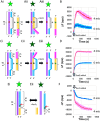During recombinase-mediated homology recognition RecQ helicases inhibit formation of toxic long-lived D-loops that could promote genomic instability
- PMID: 40377216
- PMCID: PMC12082448
- DOI: 10.1093/nar/gkaf426
During recombinase-mediated homology recognition RecQ helicases inhibit formation of toxic long-lived D-loops that could promote genomic instability
Abstract
Mutations in RecQ family helicases underlie human genetic disorders associated with genomic instability and cancer predisposition, but questions remain about how properly functioning RecQ reduces these deleterious effects. Importantly, some of the deleterious effects may result from incorrect repair of DNA double-strand breaks (DSBs) by recombinase proteins. Displacement loops (D-loops) are three-strand intermediates formed by recombinases during repair of DSB. RecQ helicases might enhance genome stability by disassembling incorrect recombinase-mediated D-loops formed between mismatched sequences and/or between short regions of accidental homology. We used bulk FRET and gel electrophoresis assays to probe the effects of RecQ family helicases in the context of ongoing recombinase-mediated D-loop formation. We found that RecQ does not differentially promote disassembly of short D-loops or D-loops that include mismatched base pairs. Thus, RecQ does not reduce genomic instability by discriminating against incorrect D-loops. In contrast, our results suggest that RecQ intervenes during D-loop formation to limit the length of recombinase-mediated D-loops. Without that intervention, D-loops can become so long that they do not spontaneously reverse. We suggest that RecQ prevents undesirable long-lived connections between chromosomes that could compromise chromosome metabolism and/or segregation and promote genomic instability.
© The Author(s) 2025. Published by Oxford University Press on behalf of Nucleic Acids Research.
Conflict of interest statement
None declared.
Figures







References
MeSH terms
Substances
Grants and funding
LinkOut - more resources
Full Text Sources

